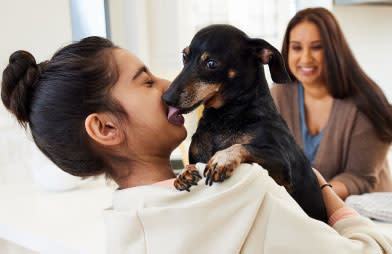Just like humans, health problems in dogs can be hereditary. This means that certain breeds are susceptible to specific health issues.
As a pet parent, it helps to know which problems your pet may encounter so you can adopt preventative habits or treatments in the hope of avoiding or minimizing them.
“The easiest thing you can do is talk to a vet about the breed-specific issues you might encounter with the pet you have,” says nutritionist Kylie Hogan.
To get you started with those conversations, here are some common issues that popular breeds often face and preventative measures you can try to take.
Hip dysplasia
Hip dysplasia and other joint issues are common in breeds like German Shepherds and Labs.
Generally, large breeds are at risk of experiencing this particular type of health concern as they age. With dysplasia, the hip joint’s ball and socket aren’t properly aligned, which leads to arthritis and makes it painful and difficult for a dog to walk.
For breeds prone to hip and joint issues, early intervention can make a big difference. Ask your vet if and when to feed supplements like glucosamine to your larger dog.
Hogan recommends introducing glucosamine before your BFF begins to show signs of hip or joint discomfort and stiffness. “As soon as they’re an adult or within the first three to four years of their life, supplementing with Glucosamine and Chondroitin is a good way to combat that,” she says.
Dental concerns
Small breeds like Chihuahuas often have a tough time with their teeth.
Brushing is more difficult in smaller mouths and teeth can also be more fragile. “It's really, really important with small dogs to be on top of dental care,” says Bosley’s assistant store manager Charlaine Lemay. “It's important for all animals, but small dogs are prone to develop issues a lot faster.”
Respiratory issues
Brachycephalic breeds like Bulldogs, Boxers, Pugs, and Boston Terriers can suffer from respiratory problems because of their (super cute!) pushed-in noses and narrow tracheas. Hot weather or excess exercise, especially, can trigger breathing difficulties.
These breeds can also struggle with proper breathing when they eat. Hogan suggests elevating their food dishes in order to combat this. “That's a really great way to feed them to prevent any choking hazards,” she says, adding that it can also aid in digestion.
Obesity
Obesity is an issue that can affect almost any pet, but specific breeds are particularly susceptible (we’re looking at you, Labs).
Pet parents with Labradors should keep in mind that they require extra exercise, and that with or without it, they’ll probably still be asking for extra snacks. Hogan recommends feeding Labs “a healthy weight food and making sure you don't go overboard with treats.”
Ear infections
We love a floppy, fuzzy-eared pup but we also know they’re prone to ear infections.
Breeds like Cocker Spaniels and Basset Hounds — or even any dog that spends a lot of time in water — need to have their ears cleaned regularly to prevent bacteria from breeding there. Repeat ear infections can lead to long-term problems for your pet and their hearing.
Ears can easily be cleaned once a month with specialty wipes, and excess fuzz on the ear’s underside should be carefully trimmed with round-tip scissors.
Hot Spots
If you’re a pet parent to a Golden Retriever then you’re probably already on high alert for hot spots.
Goldens (along with Goldendoodles and other Retriever mixes) are highly prone to skin allergies which can lead to licking, chewing, and scratching a specific spot on their skin until they develop a nasty sore known as a hot spot.
Skin allergies are frequently tied to diet, so talk to your vet (or one of our Animal Care Experts in store) about choosing a food that might keep your Golden’s allergic reactions under control. Supplements like Omega-3s can also help soothe skin.
Finally, when bathing your hot spot-prone pup, be sure to use a shampoo with moisturizing properties, such as those that contain oatmeal — and ensure their coat is thoroughly dry because the trapped moisture exacerbates the hot spot.














































